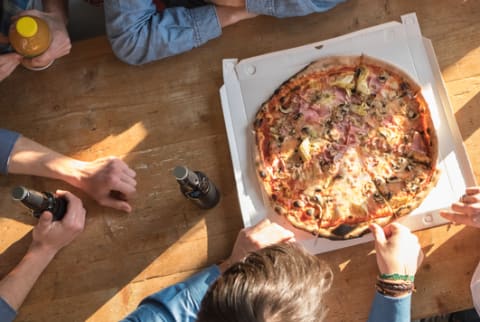Advertisement

Try paying attention to how often people (you may be one of them) label foods by using words like good, bad, right, wrong. Even worse, notice how often they describe their behavior, or themselves, as “good” or “bad” when they talk about how they’ve been eating.
“I was so good all week and then I ruined it by going crazy last night and eating all the wrong things.”
Part of this is simple human nature. Our brains like to categorize things because it makes it easier to quickly assess and determine what response is required. When you’re walking down the street and you see a person walking toward you, your brain immediately wants to assess that person’s intentions so it can determine whether you should stop and smile or run the other way.
What you eat is not a measure of your moral character.
But when it comes to eating, we tend to go one step further and place a moral overlay onto food and our choices around food. Applying this moral lens is not helpful when we’re trying to make choices that will nourish our bodies and promote true health. Here are three reasons why we shouldn't morally categorize food:
1. It’s not true.
Food is not “good” or “bad.” Food is just molecules. The sugar-glazed doughnut and the green smoothie are both just molecules. Some of those conglomerations of molecules simply fit together in a way that is more bioavailable and better able to nourish your body than others.
Think of a jigsaw puzzle. Some pieces fit properly into spots and others don’t; this doesn’t make them good or bad, it just means they don’t belong there. They’re not bad pieces; they’re just not the piece that your puzzle needs in that spot.
Further, what fits for one person might not fit for another. For example, freshly picked organic strawberries on a summer day might be deeply nourishing for you, but for someone who hates strawberries, or suffers from an allergy, they’re not the right fit.
2. It doesn’t motivate us.
People often believe that it’s important to approach eating with this kind of moral framework because it motivates us to stay on track with healthy eating when we can feel good about our “good” choices and bad about our “bad” choices. It’s the old carrot-and-stick approach.
However, what I see as a nutritionist time and time again is that people aren't actually all that motivated by doing the “right” thing. What they are motivated by is their goals and their thoughts about how great they’ll feel when they reach them.
This is why I work with all of my clients to create a clear and compelling vision for what they truly want their relationship with food to look and feel like. For our brains this is far more motivating than the moral judgment that comes with believing that we’re being “good” or “bad.”
3. It actually fosters self-sabotage.
Not only does this moral lens not motivate us, it actually contributes to self-sabotaging behavior.
When we believe that we’ve been “bad” with our food choices, we feel guilty. Guilt makes us feel worse, which turns on the reward-seeking area of our brain and we go searching for those things that we know will immediately make us feel better like sugar, salt, and fat.
Guilt also triggers what I call the “What the Heck Effect,” which is what happens when you believe that you’ve made a “bad” food choice, feel awful as a result, and then decide “what the heck, I’ve screwed the whole day up now, I might as well go nuts.”
The truth is that what you eat is not a measure of your moral character. And there is nothing inherently “good” about a kale salad or “bad” about a chocolate brownie.
So, the next time you catch yourself starting to slip into moral judgments and labels around food, leave the guilt behind and try to instead think about food as molecules or puzzle pieces.
Consider which ones are going to be a better fit to nourish your body, energize your mind, and support your overall health goals, and let that guide and motivate your choices.
Watch Next
Enjoy some of our favorite clips from classes
Enjoy some of our favorite clips from classes
What Is Meditation?
Mindfulness/Spirituality | Light Watkins
Box Breathing
Mindfulness/Spirituality | Gwen Dittmar
What Breathwork Can Address
Mindfulness/Spirituality | Gwen Dittmar
The 8 Limbs of Yoga - What is Asana?
Yoga | Caley Alyssa
Two Standing Postures to Open Up Tight Hips
Yoga | Caley Alyssa
How Plants Can Optimize Athletic Performance
Nutrition | Rich Roll
What to Eat Before a Workout
Nutrition | Rich Roll
How Ayurveda Helps Us Navigate Modern Life
Nutrition | Sahara Rose
Messages About Love & Relationships
Love & Relationships | Esther Perel
Love Languages
Love & Relationships | Esther Perel


















